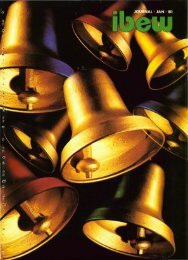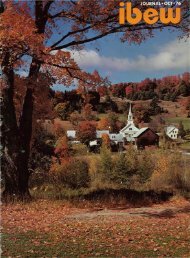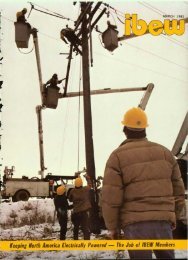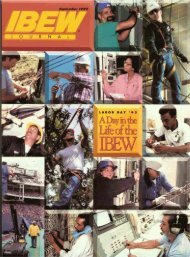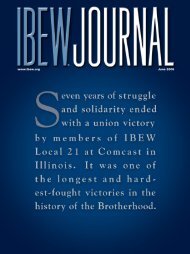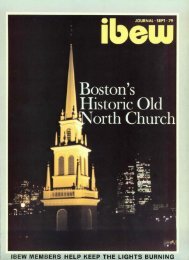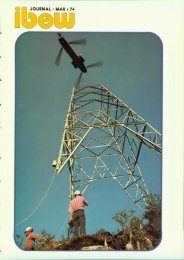n - International Brotherhood of Electrical Workers
n - International Brotherhood of Electrical Workers
n - International Brotherhood of Electrical Workers
You also want an ePaper? Increase the reach of your titles
YUMPU automatically turns print PDFs into web optimized ePapers that Google loves.
argaining table with the employer and in every unit where full representation for the members is a daily<br />
re ality. Th e local union also has committees which take ac tive roles in civic and community affairs. Th e<br />
photographs on these two pages show some <strong>of</strong> the committees wh ich help make the union functions <strong>of</strong><br />
Loca l 1859 a story <strong>of</strong> progre ss.<br />
the bargaining uni t.<br />
The first t raining prog r am<br />
stressed union leadership. Sessions<br />
were conduc ted by qualified pe rsons<br />
from wi thin the teaching pr<strong>of</strong>ession.<br />
with emphasis on experienced persons<br />
from the Dcpartmelll <strong>of</strong> Laor,<br />
Roosevelt University, the University<br />
<strong>of</strong> Wisconsin. the University<br />
<strong>of</strong> Illinois, the Federal Mediation<br />
and Conciliation Service, and the<br />
National Labor Relations Board.<br />
In addition 10 classes cond ucted<br />
at the loca l's headqua rters, certain<br />
omcers, Executive Board members,<br />
and shop stewards attended specialized<br />
labor relations courses at various<br />
universities. The effectiveness<br />
<strong>of</strong> the educational trai ning has<br />
proved its worth in the loca l's accomplishments<br />
at the bargaining<br />
table and in its impressive representation<br />
<strong>of</strong> its membership in all<br />
phases <strong>of</strong> employment.<br />
It soon became apparent that,<br />
beca use <strong>of</strong> the size <strong>of</strong> the barga ining<br />
uni t, the complicated laws that<br />
had developed, and the extent <strong>of</strong><br />
daily sessions held with management,<br />
a capable <strong>of</strong>fiecr, one who<br />
was skilled in the educ.Hional process,<br />
would be needed to supervise<br />
and direct (he training <strong>of</strong> union<br />
personnel.<br />
JOURNAL FOR MAY, 1971<br />
Charles Schaffer, an Executive<br />
Board member, was appointed<br />
chai rman <strong>of</strong> the Educational Committec,<br />
and he has properly chnnnelcd<br />
the local's representatives into<br />
training in courses that have proved<br />
very fruitful. While the accomplishments<br />
have, primarily. been the<br />
results <strong>of</strong> efforts by the local union,<br />
the ingenuity, willingness, and cooperation<br />
<strong>of</strong> the members and those<br />
taking the various courses have also<br />
been required.<br />
In order to carry out the ed ucation<br />
programs, careful consideration<br />
was given to utilizing the facilit ies<br />
<strong>of</strong> a universi ty. The Labor Division<br />
<strong>of</strong> Roosevelt University W:lS selected<br />
for :lssistanee in the formation <strong>of</strong><br />
classes in labor leadership. TIle first<br />
classes involved stewa rd training,<br />
arbitration and mediation, cOnlract<br />
languagc, and leadership. The<br />
courses have been broadened over<br />
the years.<br />
Special significance W:1S placed<br />
upon the needs <strong>of</strong> the production<br />
workcrs, irr view <strong>of</strong> the f:lci Ihal a<br />
large portion <strong>of</strong> the b:lrgaining unit<br />
consists <strong>of</strong> employees assigned to<br />
the production field. Consequently,<br />
a thorough understanding <strong>of</strong> job<br />
evaluation and piece rates has been<br />
required <strong>of</strong> shop stewards directly<br />
involved in the daily representation<br />
<strong>of</strong> these workers.<br />
Hugh Young, Recording Secretary,<br />
has been chairman <strong>of</strong> the<br />
Wage Incentive Committee since its<br />
inception. As a result <strong>of</strong> his di ligcnce,<br />
b:lckground and training in<br />
production methods, piece rates,<br />
and time and motion studies, the<br />
wages <strong>of</strong> production workers have,<br />
not only been carefully guarded, but<br />
have, in most cases, been increased.<br />
[n Ihe production field, job vacancies<br />
frequently occur; consequcntly,<br />
the MovemCnt <strong>of</strong> Per·<br />
sonncl Committee serves a very<br />
import:llll func tion. nle committee<br />
carefully screens all jobs to be cer·<br />
tain that proper individuals arc<br />
granted advancement, based upon<br />
their ability and seniority. This<br />
tedious work by the commi ttee has<br />
been capably performed, and the<br />
job rights <strong>of</strong> the unit membe rs have<br />
been fully protected.<br />
Wit h a membership as large as<br />
that <strong>of</strong> Local 1859, numerous grievances<br />
arise from lime to lime. Two<br />
capable <strong>of</strong>ficers have been appointed<br />
to and have served the Grievance<br />
Committee well-Vice President<br />
Robert Gorman and Executive<br />
Board member David Uric, who<br />
have becn co-chairmen <strong>of</strong> the com-<br />
15




